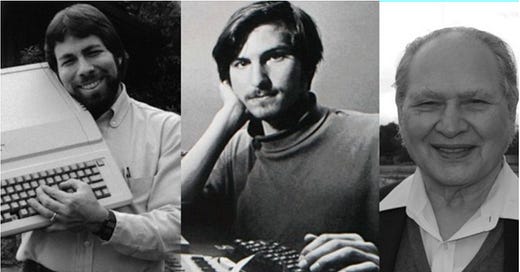Wednesday 1 April, 2020
On this day…
… in 1976, Apple was founded by these three guys.

Left to right: Steve Wozniak (‘Woz’), Steve Jobs, Ron Wayne
Ron who? Ronald Wayne co-founded Apple Computer Company (now Apple Inc.) as a partnership with Steve Wozniak and Steve Jobs, providing administrative oversight and documentation for the new venture. Twelve days later, he sold his 10% share of the new company back to Jobs and Wozniak for US$800, and one year later accepted a final US$1,500 to forfeit any potential future claims against the newly legally incorporated Apple, totaling $2,300.
Apple’s Market Cap (total valuation) today is $1.113 trillion. Looks like Ron (who’s now 85) sold his 10% at a heavy discount.
David Silver wins the ACM Computing prize
He’s a Professor at University College London and a Principal Research Scientist at DeepMind and a central figure in the area of deep reinforcement learning. His most highly publicized achievement was leading the team that developed AlphaGo, the computer program that defeated Lee Sedol, the world champion of the game Go. Silver developed the AlphaGo algorithm by combining ideas from deep-learning, reinforcement-learning, traditional tree-search and large-scale computing. (And also Google-scale cloud computing, I guess.)
The Prize is awarded for an early to mid-career fundamental innovative contribution in computing that, through its depth, impact and broad implications, exemplifies the greatest achievements in the discipline. It comes with $250,000.
Peter Sinclair RIP
The economist Peter Sinclair has died of Covid-19. My colleague Diane Coyle has a lovely tribute to him on her blog.
My memories are typical of those people are emailing. I pitched up at Brasenose College, Oxford to read PPE at the age of 17, completely out of my depth socially and intellectually, although pretty sure I was going to become a philosopher and sit in a Parisian cafe all day reading and writing. Peter’s absolute vocation for teaching, his brilliance, his kindness, soon turned me into an economist. He’d sent pre-reading before we turned up – Roy Harrod’s biography of Keynes for instance (this pre-dated the publication of the Skidelsky books). In the first term all his students were driven in batches of four for afternoon tea at the Feathers Hotel in Woodstock. One of our group came from Kenya and Peter tried a bit of conversation in Swahili – my first experience with his knowledge of at least one phrase in every language he’d ever encountered.
In tutorials with Peter, even poor essays were kindly treated – one learned to interpret comments such as, “That’s very, very – very – interesting,” as signalling a terrible error. He was a brilliant teacher. His explanation of different social welfare functions is still vivid in my mind. He eviscerated the inefficiencies of the CAP by pointing out that at the time the EEC butter mountain weighed more than the population of Austria. He responded to any sign of mild student interest in anything by sending one off with additional readings, perfectly pitched, and embracing everything from classics to the latest books and papers. He scheduled one-to-one tutorials over breakfast in the cafe in Oxford market if one was very interested. He knew everything: whenever I’ve discussed any subject with him over the years, he was able to cite the entire literature and send me scurrying off to catch up on all the references. In meetings, he would listen carefully to the discussion then chip in with some deep and important point.
He was clearly a wonderful teacher and a very nice man.
Why weren’t we ready?
Terrific investigation by Harry Lambert.
On its website, MI5, the home security service, states that terrorism is “the biggest national security threat that the UK currently faces” but that conclusion is not supported by the National Risk Register. This is a document “given no publicity at all”, according to David Spiegelhalter, professor of risk at Cambridge University. While it is true that terror attacks are considered to be more probable than a pandemic, they are classified as only having a Level 3 impact. Other key threats – cyber attacks on infrastructure, widespread flooding, a nationwide blackout – are all rated as both less likely and less impactful than a severe pandemic.
Covid-19 is that pandemic. That it is a novel virus and the government’s plans were for influenza is “immaterial”, says David Alexander, professor of disaster risk reduction at University College London. The coronavirus closely resembles the threat anticipated in government planning documents, of a highly infectious respiratory disease that critically hospitalises between one and four per cent of those it infects. And yet the government appears to have been unprepared. The UK lacks ventilators, personal protective equipment and testing kits, while emergency procedures for manufacturers and hospitals are being improvised on the fly.
The longer this goes on, and the more we begin to learn, the worse this looks for the government machine. No wonder some of my friends on the Continent are incredulous and aghast. They thought the UK was a well-governed state. Or maybe what we’re finding — e.g. about the UK struggling to do 7,000 tests a day while Germany does half a million a day — is that the British state simply lacks the capacity to do what it needs to do. And that has to be at least partly due to the attempts by various Tory administrations (I’m looking at you, George Osborne) to “shrink the state”.



